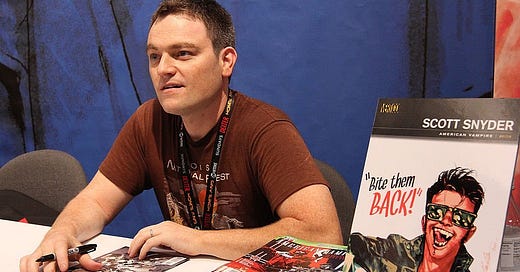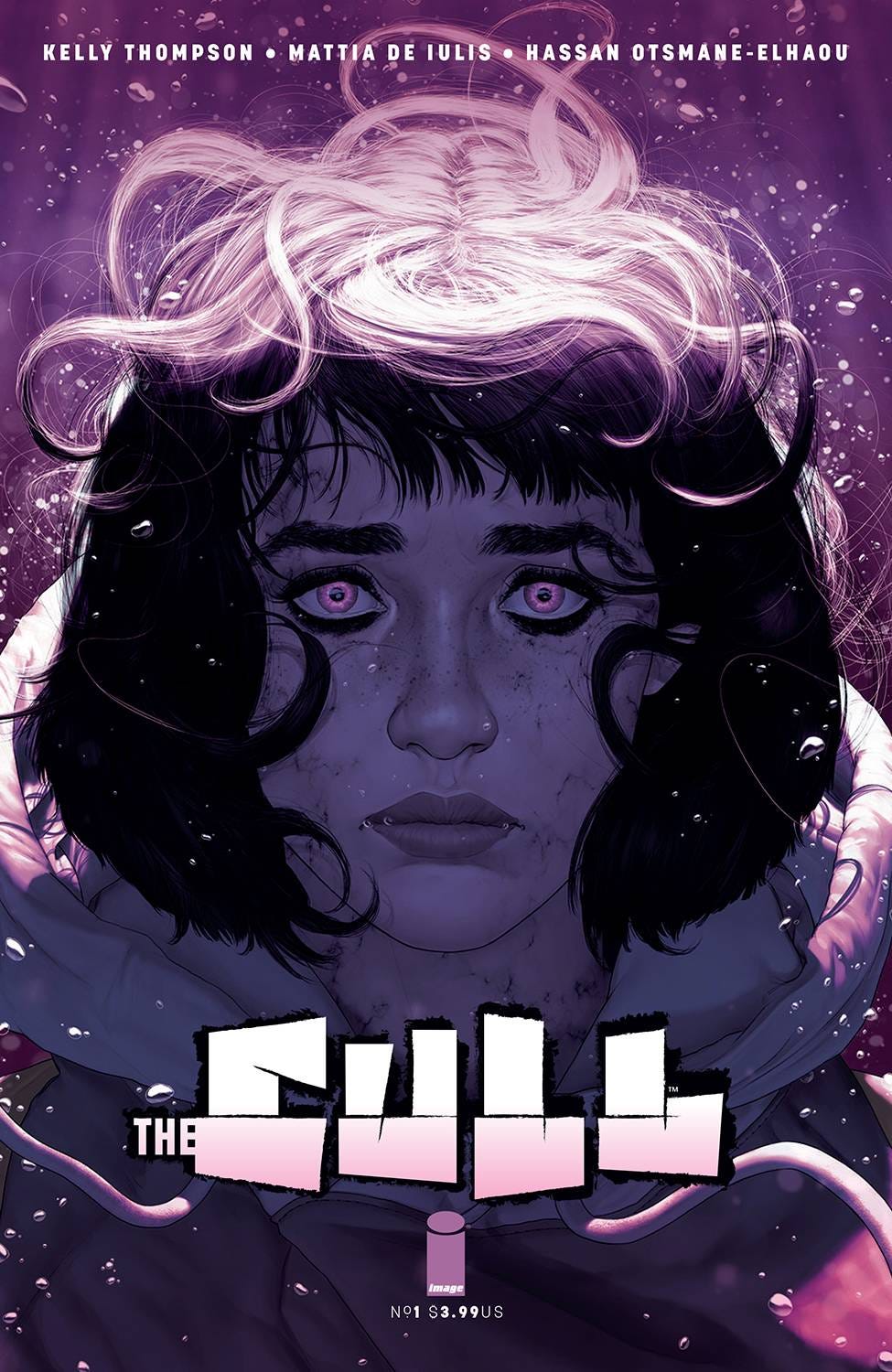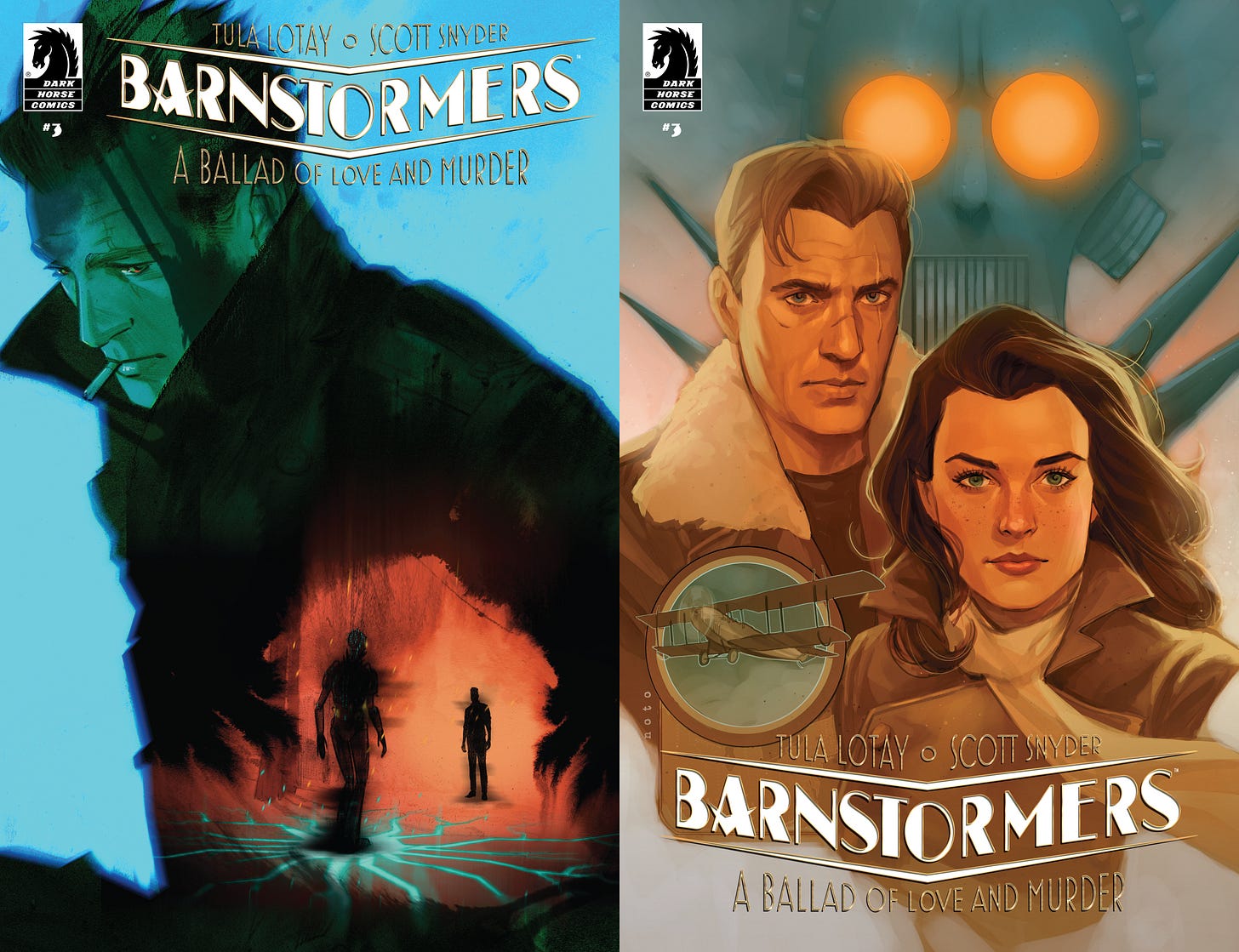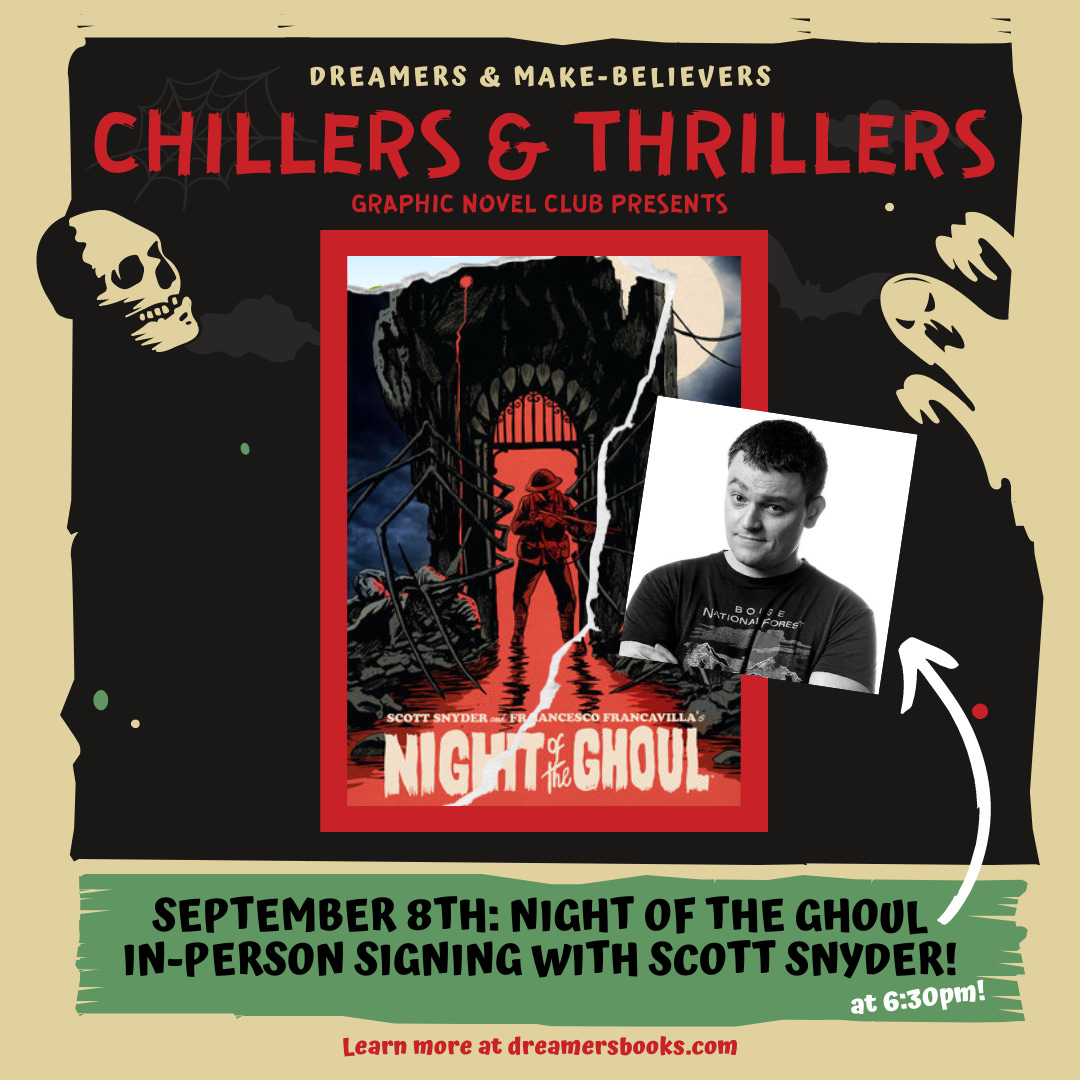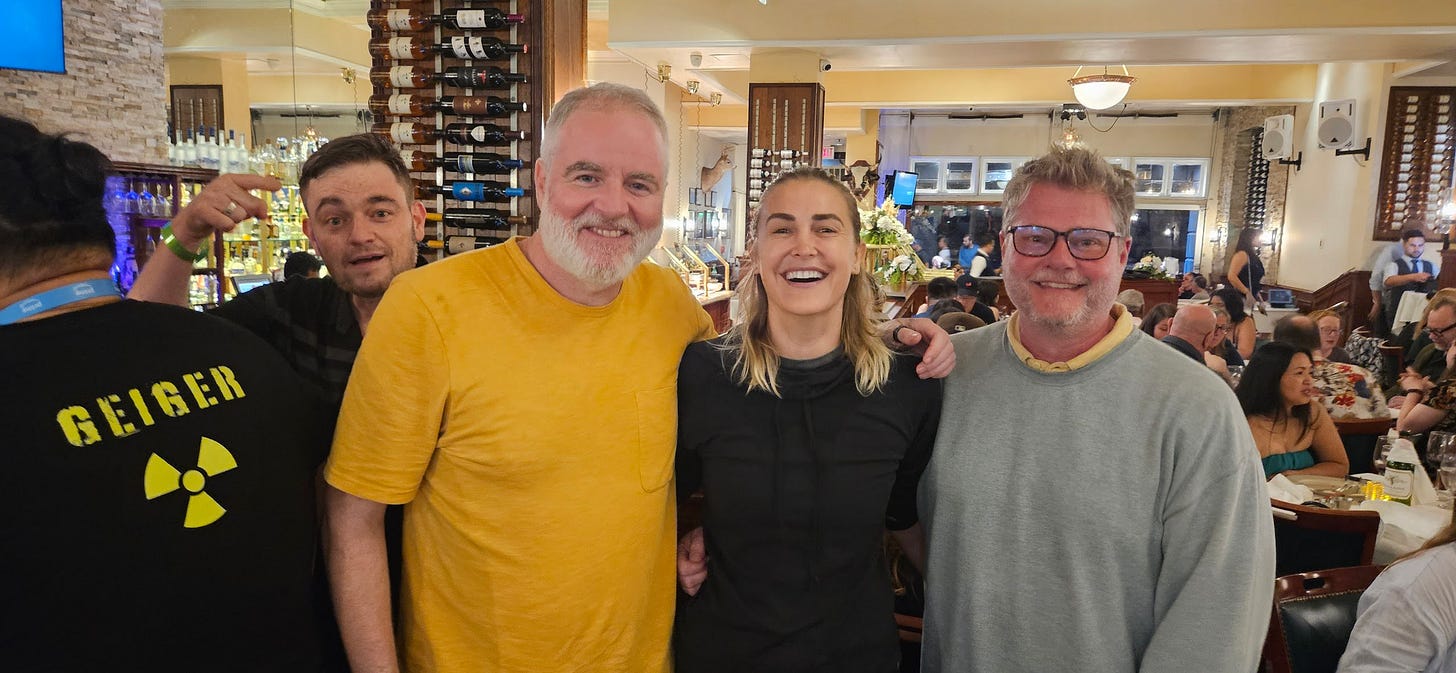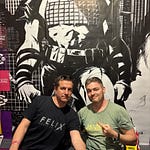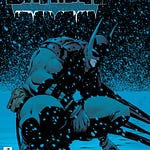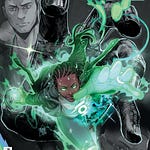Hey guys, it's Scott.
It is Wednesday, September 6th, and for the first time in many, many weeks, I have this house all to myself. It is a very strange and wondrous feeling. The kids, our children, hopefully yours too, are back in school. I have loved having this summer with them, but by the end, I was just like, “please take these children.” And they're gone. And so today I can pad around the house in my boxers before working and enjoy the strange silence with no goblins or anything hiding anywhere.
So a bit of housekeeping, but first a quick primer on today's post. I want to talk a little bit about a subject that's close to my heart. I've brought up a couple times, but it's about being a creator and dealing with mental health, making sure your mental health is good. I've tried to be pretty open and transparent over the years about my own struggles with anxiety and depression and I just wanted to bring that subject a little bit to the fore, because I've been asked more and more lately about coping in that way. I have a lot of friends that are creators in this market right now, and it's a tough market right now, creator-owned, especially. There's a big maw of books out there, a lot of great, great books, but it is a tougher market to sell. It is a tougher market to make a living in. And there's a lot of anxiety, a lot of nervousness, a lot of uncertainty. So I wanted to just sort of talk a little bit confessionally and personally as a way of giving a window into the matter in which I deal with it or have learned to deal with it over the years.
For paid subscribers, I want to do a bit of a mini-lesson. I'm going to look at a book that I really love, The Cull.
It's a new Image book by pal and writer extraordinaire Kelly Thompson and Mattia De Iulis. It's a really great book. And a subject I want to talk a little bit about is silence, allowing the visual storytelling to do the work, allowing your artist to really flex and shine and yet at the same time, being able to make sure that you're giving your artist or co-creator enough information in a scene to do that, to really know what they're going for. And so finding that balance, so we'll talk a little bit about that and look at a couple pages from the book.
But some housekeeping. Barnstormers: A Ballad of Love and Murder #3 is out in stores TODAY. I’ve talked plenty about this book, so just make sure to pick it up and see how the whole saga comes to an end.
And this week I am in Baltimore. I am flying there on Friday afternoon. I get in at 5:10 and then I have my very first event, a signing and Q&A, a book club for Night of the Ghoul, at Dreamers & Make Believers bookstore. Ty, best assistant, will put the address here:
Dreamers & Make Believers
400 S Highland Ave, Baltimore, MD, 21224
(410) 624-5624
info@dreamersbooks.com
To be honest, this is a really great chance, even if you're at the con, obviously, if you're not, it's your only chance, but if you're not at Baltimore Comic-Con on Saturday, I'm only there for one day. Even if you are there, this is really a great chance to come say hello in a casual setting, get whatever you want signed, and meet up. So I really hope you'll check it out. I also am deeply, deeply proud of Night of the Ghoul. I love that book. It's over at 20th Century with a really cool director attached and I'd love to talk more about it with you guys. So I hope you'll show up. Dreamers & Make Believers bookstore, 6:30 to 7:30 will be the signing and then 7:30 to about 8:30 will be a Q&A where I'll answer your guys' questions and their questions about the book and about comics and about anything you want to ask me. So please come to that. Again, it will be your best chance of catching me.
And then I'm at the convention itself. Just Saturday, I'm going to do one, maybe two signings. I'll post my schedule today. It will hopefully be posted with this post, but I'm really only there very briefly. So the thing I'd say is if you're a paid Best Jackett subscriber or if you want to become one today then do it. You'll have a chance at the beginning of each signing to come up and get your book signed before the line is really active.
So I would highly suggest you do that. I haven't been to Baltimore in a long time, so the lines might be long. Anyway, I have family in Baltimore and I’m trying to make it not an intense work trip. So I hope to see you guys there!
Okay, so first thing, I'm going to make this brief, but I feel as though it's a subject that we don't talk about a lot. But I think being a creator, a lot of the time there's a mystique around being introspective or strange or troubled or all of these kinds of things that get mythologized all the way back from the beginnings of the myths around creators or the legends of great artists and writers that they're always sort of they have some kind of view of the dark side or they struggle with things in some way. And I do think that's often true. I think that the job lends itself, essentially, to challenges. I mean, to make something that you care about, you have to stare into a screen and think about the things that keep you up at night, good and bad, and then make something out of those things. And then, to top it off, you have to present that thing that's incredibly sensitive and this big vulnerable part of yourself to the world to be criticized, to be read by strangers. I mean, it's a really harrowing job.
Now, don't get me wrong, my wife works at a cancer center in pediatric and early detection breast cancer. Writing is not a harrowing job comparatively to many things in the world. So there's a scale. But in terms of having to put yourself and your feelings on the line, it can be challenging. It makes you open and susceptible and vulnerable to the whole world. And you have to make things that matter to you in some way, even if you think they’re escapist, they’re not really escapist because even if the world you’re trying to escape to is essentially an extension of the things you want to be true in the world now—if it’s dystopian it’s probably a lens through which you’re seeing the things you don’t like about this world. So the point is you’re making things out of material that matters to you and you’re doing it alone largely.
And so yes, I think that the job itself can be a catalyst a lot of the time for troubles. So for me, it started when I was a teenager. The first time that I went away to college, when I was 18, I had my first real brush with anxiety. I went away and I was living in Providence. I had a long-distance relationship, she was in Michigan, I didn't like my room, all kinds of stuff, like stupid things. But what happened was, beyond the actual stimuli and the problems, it was like a switch began to flip in my head and a voice started. And this voice was just always criticizing me, always saying to me, “you're really going to do that? You're really going to write that? That's terrible…” if I was working on anything for fiction. Every line, “oh, that's awful.” And it started off quieter and more needling and critical. It made me stressed and made me anxious and worried. But then the more that I didn't take care of myself, the more that I tried to avoid it or go out and party or do things that made me sort of take my mind off it in unhealthy ways, the louder it got.
And it became more and more invasive for me until I really, really had trouble by the end of that first year away at school. I almost just had to come home and stop because everything I did was this voice in my head was criticizing and I'd have these panic attacks where it was just, “you think you're gonna sit down and write that? That line's terrible.” And then my heart would start beating really fast and I'd have to get up and walk around and I'd sit back down to write again. “Oh, you're going to write that line? It's even worse.” And it just wouldn't stop. And it was physically exhausting. It becomes physically just draining because your body is acting as though it's alarmed. It's acting as though you're being chased by a fucking lion or something like that where your whole emergency system is going off. It's just physically depleting at some point.
And so it got really debilitating until I finally decided I needed to go see somebody andand start taking medication and it took me a while to sort of figure out the right combination, but eventually what the medication did at least was not solve everything but it gave me a tiny bit of time it gave me some purchase as I could feel myself in a normal or a kind of regular, stable period. I could feel the tremors of this anxiety coming and I understood, I started to begin to understand through therapy, what some of the triggers were. For me, big life changes, big work pressure, obvious things, but when they all kind of combine, I can start to feel it. And so the medication gave me like almost a window to start to take care of myself as opposed to going down a worse path which would be checking things on the internet or avoiding trying to reinforce my belief system or what could I look at from my teacher at that time in college that made me feel good about myself. Those are unhealthy habits as opposed to going out and getting exercise, as opposed to reminding yourself these are just invasive thoughts, all of this stuff. So from that point forward I had a bit of purchase on it.
But I'll tell you, like, when I started Batman, my God, I mean, I am so grateful to Greg Capullo and my wife Jeanie, obviously, but to James Tynion IV also. I would call him in the middle of the night. Oh my God, I was like, “I'm the worst. Everyone's going to see I'm the worst.” And he would just walk me through the things that I had learned to say about, “listen, this is just depression. This is just anxiety.” Because for me, anxiety, if not taken care of, what happens is I'll fall into depression. It's only happened to me a couple times in life, but it's a much more difficult state where for me, it's almost like another lever is pulled and like if one set of lights is flickering and distracting and upsetting and buzzing and all of that with anxiety, depression is when the lights go out and it's just everything feels like a terrible funhouse mirror reflection back at you. Everywhere you look is something saying to you, “this isn't going to work out. You should just give up in some way.”
And so anyway, when I started on Batman, it definitely came back in a really big way. And I tried my best to take care of it, but we were also pregnant and it was really tough. And with their help, I was able to manage, but there have definitely been periods, both at the beginning when I was doing Batman, then a couple years in when we did Zero Year and I was also doing Superman Unchained where it became overwhelming again. While I didn't fall into really bad periods of depression necessarily, I definitely got to a point with anxiety where it was really distressing.
I don't know how helpful it is to hear any of this, but people seem to think giving a window into the fact that having struggles with mental health happens and happens to me still to this day, all this hopefully provides some sense that it's good to talk about, it's good to treat and to be open with your friends about and to ask for help, because it wasn't until I really sort of recognized what was going on with me that I started to really understand how to work through it. I thought it was just all this voice in my head was telling the truth or I thought I could fight through it by exercising all the time or by getting A's in school or by writing the best Batman ever or whatever it was in my head that became the goal to sort of prove the voice wrong as opposed to ignoring the voice or saying the voice is just an illness in your head right now. It always led me down a worse slope. And so recognizing those things and becoming aware of them and talking very openly about them has really helped.
So I hope, especially as we go into a really stressful year with the election coming, all kinds of stressors out there in the culture, that you, if you're a creator, will be good to yourself and open about trying to find ways of getting real help, both medically, through therapy, psychiatry, but also through friends and family and being very open about it. I'm always here to talk about these things and I've spoken to a lot of students but also other creators at times who have said things online that made me aware that it seemed like they were struggling. And I've had creators reach out to me in great ways. Jock was another one that was incredibly helpful to me when I was really struggling. Creators reach out to me when they had a sense that things weren't going so well. And I still get tremors. I mean, believe me, I still have trouble. I'm sure I could wake up tomorrow and be dealing with huge anxiety and have to sort of work through it in a healthy way.
Just to be clear, there was a time when I was away with my family a couple of weeks ago before I got COVID where the writer's strike almost seemed like it was going to end. And as much as I wanted to end and I want to go back in the room for Wytches, I've also made plans for comic stuff that I needed what everyone told me we would have time-wise for the strike, which is at least September, to complete some of that stuff. Could I do it if the strike ended? Sure. But it would be tough. It would make my life hard. And everyone I knew kept saying the strike is definitely going to go all the way through November or December. And so at that moment, when it seemed like the strike might end in a week, I woke up with panic attacks, like, what am I going to do?And it triggered that voice again. “You're such an idiot. Why did you sign up for this stuff? You're never you're going to fail at Wytches. The show is going to be a bomb because you're not going to have enough time. And then the comics are going to be fucked.” But, you know, I know how to deal with that and I'm good.
So the point is that it's ongoing. It's not something you just get over and it's done. But I hope that you guys will be kind to yourselves and to each other regarding it and make it a very open conversation in general, because it's a tough job. It is. Again, not as tough as many other jobs at all in the world. But psychologically, it can be a rough one sometimes. Okay, I'm going to jump over to the paid post.
Listen to this episode with a 7-day free trial
Subscribe to Our Best Jackett to listen to this post and get 7 days of free access to the full post archives.

